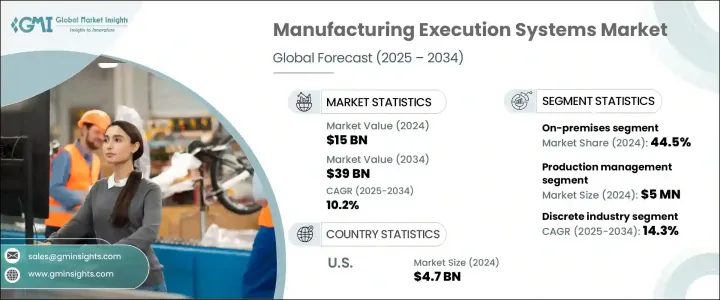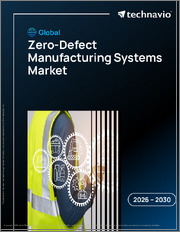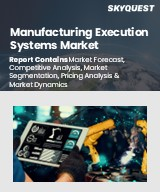
|
시장보고서
상품코드
1716655
제조 실행 시스템 시장 기회, 성장 촉진요인, 산업 동향 분석, 예측(2025-2034년)Manufacturing Execution Systems Market Opportunity, Growth Drivers, Industry Trend Analysis, and Forecast 2025 - 2034 |
||||||
세계 제조 실행 시스템 시장은 2024년에 150억 달러에 달했으며, 2025년부터 2034년까지 연평균 10.2%의 성장률을 보일 것으로 예상됩니다.
자동화된 컴플라이언스 및 품질 관리에 대한 관심이 높아진 것이 이러한 성장의 주요 요인입니다. 제약, 항공우주, 식품 및 음료, 자동차 등의 산업은 엄격한 규제 요건을 준수해야 하며, 이를 준수하기 위해 MES 솔루션이 필수적입니다. 이러한 시스템은 제조 공정의 실시간 추적, 문서화 및 추적성을 가능하게 하여 전반적인 효율성을 향상시키면서 업계 표준을 충족하는 데 도움을 줍니다. 결함을 최소화하고, 리콜을 줄이고, 고객 만족도를 높이려는 제조업체에게 품질 관리는 가장 중요한 과제입니다. MES 솔루션은 검사, 편차 추적, 시정 조치와 같은 품질 관리 기능을 자동화함으로써 업무를 간소화하고 컴플라이언스를 강화하여 세계 시장에서의 수요를 촉진하고 있습니다.

인더스트리 4.0의 확산은 전 세계적으로 MES 솔루션에 대한 수요를 가속화하고 있습니다. 인더스트리 4.0은 첨단 정보통신 기술을 산업 생산에 통합하여 자동화, IoT, 지능형 의사결정을 통해 제조업을 변화시키고 있으며, MES는 기계, 센서, IoT 지원 장치로부터 실시간 생산 데이터를 수집하여 원활한 자동화 및 분석 기반 의사결정을 가능하게함으로써 이러한 변화에 중요한 역할을 하고 있습니다. 이 변화에 있어 중요한 역할을 하고 있습니다. MES는 워크플로우를 자동화하고 수동 프로세스에 대한 의존도를 줄임으로써 업무 효율성을 최적화하고 처리 시간을 단축하며 오류를 최소화합니다. 인더스트리 4.0을 채택하는 제조업체가 늘어남에 따라 지능형 자동화 및 데이터 기반 생산 관리를 촉진하는 MES 솔루션에 대한 수요는 계속 증가하고 있습니다.
| 시장 범위 | |
|---|---|
| 시작 연도 | 2024년 |
| 예측 연도 | 2025-2034년 |
| 시작 금액 | 150억 달러 |
| 예상 금액 | 390억 달러 |
| CAGR | 10.2% |
이 시장은 소프트웨어와 서비스로 구분됩니다. 소프트웨어 분야는 실시간 생산 모니터링, ERP 및 PLM과 같은 기업 시스템과의 원활한 통합, 고도의 분석에 기반한 의사결정 등의 요구가 원동력이 되어 2023년 75억 달러의 시장을 창출했으며, MES 소프트웨어는 AI, IoT, 클라우드 기능을 통합하여 운영 가시화, 워크플로우 최적화, 법규 준수를 실현합니다. 스마트 제조의 도입이 증가함에 따라 효율성을 높이고, 다운타임을 줄이며, 생산성을 향상시킬 수 있는 확장 가능한 클라우드 기반 MES 솔루션이 선호되고 있습니다.
전개 방식별로 보면 시장은 온프레미스형, 클라우드형, 하이브리드형으로 나뉩니다. 온프레미스형은 2024년 시장의 44.5%를 차지했으며, 고도의 커스터마이징과 데이터 기밀성이 요구되는 업종에서 선호되고 있습니다. 기밀성이 높은 독점 데이터와 엄격한 규제 요건을 다루는 산업에서는 낮은 지연시간과 레거시 시스템과의 호환성으로 인해 온프레미스형 MES가 선호되고 있습니다. 온프레미스 MES는 초기 투자비용은 높지만, 실시간 처리의 장점으로 인해 대규모 제조업체에게 매력적인 선택이 되고 있습니다.
또한 용도별로 생산 관리, 품질 관리, 재고 관리, 유지보수 관리, 성능 분석, 기타 기능으로 세분화되며, MES 솔루션은 워크플로우를 개선하고 자원을 효율적으로 할당하며 생산 활동을 실시간으로 모니터링하기 때문에 생산 관리는 2024년 500만 달러로 부문을 주도했습니다. 이러한 시스템은 제조업체의 업무 효율성 향상, 사이클 타임 단축, 병목현상 해소를 돕습니다.
최종 이용 산업별로 보면 MES 도입은 프로세스 산업과 개별 산업으로 확산되고 있습니다. 공정 산업은 컴플라이언스, 품질 관리, 실시간 공정 모니터링을 위해 MES를 활용하여 리소스 최적화 및 규제 준수를 실현하고 있습니다. 고급 MES 기능은 배치 추적, 레시피 자동화, 예측 모델링을 지원하여 제조업체의 효율성을 높이고 낭비를 줄이며 일관된 제품 품질을 유지할 수 있도록 돕습니다.
미국의 MES 시장 규모는 2024년 47억 달러에 달했으며, 이는 인더스트리 4.0의 급속한 도입, 스마트 제조에 대한 투자 증가, 규제 준수 요구사항에 힘입은 결과입니다. 실시간 생산 모니터링, 예지보전, 디지털 트윈 기술에 대한 수요 증가는 자동화, 산업 생산성, 제조 보안에 중점을 둔 시장 강화로 이어지고 있습니다.
목차
제1장 조사 방법과 조사 범위
제2장 주요 요약
제3장 업계 인사이트
- 업계 생태계 분석
- 밸류체인에 영향을 미치는 요인
- 이익률 분석
- 디스럽션
- 향후 전망
- 제조업체
- 유통업체
- 공급업체 상황
- 이익률 분석
- 주요 뉴스와 대처
- 규제 상황
- 영향요인
- 성장 촉진요인
- 인더스트리 4.0과 스마트 매뉴팩처링 채용 증가
- 규제 준수와 품질 관리에 대한 수요 증가
- 제조 공정 복잡화
- 클라우드 기반 MES 솔루션의 진보
- 실시간 데이터와 예측 분석 요구 상승
- 업계의 잠재적 리스크·과제
- 높은 도입 비용과 유지보수 비용
- 레거시 시스템과의 통합 과제
- 성장 촉진요인
- 성장 가능성 분석
- Porters 분석
- PESTEL 분석
제4장 경쟁 구도
- 소개
- 기업 시장 점유율 분석
- 경쟁 포지셔닝 매트릭스
- 전략 전망 매트릭스
제5장 시장 추정과 예측 : 제공별, 2021-2034년
- 주요 동향
- 소프트웨어
- 서비스
제6장 시장 추정과 예측 : 전개 방식별, 2021-2034년
- 주요 동향
- 온프레미스
- 클라우드
- 하이브리드
제7장 시장 추정과 예측 : 용도별, 2021-2034년
- 주요 동향
- 생산 관리
- 품질 관리
- 재고 관리
- 유지보수 관리
- 퍼포먼스 분석
- 기타
제8장 시장 추정과 예측 : 최종 이용 산업별, 2021-2034년
- 주요 동향
- 프로세스 산업
- 식품 및 음료
- 석유 및 가스
- 화학
- 제지·펄프
- 제약
- 에너지·전력
- 상하수도
- 기타
- 디스크리트 산업
- 자동차
- 항공우주
- 일렉트로닉스
- 의료기기
- 기타
제9장 시장 추정과 예측 : 지역별, 2021-2034년
- 주요 동향
- 북미
- 미국
- 캐나다
- 유럽
- 영국
- 독일
- 프랑스
- 이탈리아
- 스페인
- 러시아
- 아시아태평양
- 중국
- 인도
- 일본
- 한국
- 호주
- 라틴아메리카
- 브라질
- 멕시코
- 중동 및 아프리카
- 남아프리카공화국
- 사우디아라비아
- 아랍에미리트
제10장 기업 개요
- ABB Ltd.
- Aegis Software
- Applied Materials Inc.
- AVEVA Group PLC
- Cerexio Pte Ltd
- Dassault Systemes S.A.
- Emerson Electric Co.
- Epicor Software Corporation
- Eyelit Technologies
- General Electric Company
- Honeywell International Inc.
- iTAC Software AG
- Oracle Corporation
- Rockwell Automation Inc.
- SAP SE
- Siemens AG
The Global Manufacturing Execution Systems Market reached USD 15 billion in 2024 and is expected to grow at a CAGR of 10.2% from 2025 to 2034. The increasing focus on automated compliance and quality management is a key driver behind this growth. Industries such as pharmaceuticals, aerospace, food and beverage, and automotive must adhere to strict regulatory requirements, making MES solutions essential for ensuring compliance. These systems enable real-time tracking, documentation, and traceability of manufacturing processes, helping businesses meet industry standards while improving overall efficiency. Quality management has become a top priority, with manufacturers looking to minimize defects, reduce recalls, and enhance customer satisfaction. By automating quality control functions such as inspections, deviation tracking, and corrective actions, MES solutions enhance compliance while streamlining operations, fueling demand across global markets.

The widespread adoption of Industry 4.0 is accelerating the need for MES solutions worldwide. Industry 4.0 integrates advanced information and communication technologies into industrial production, transforming manufacturing through automation, IoT, and intelligent decision-making. MES plays a crucial role in this transformation by capturing real-time production data from machines, sensors, and IoT-enabled devices, enabling seamless automation and analytics-driven decision-making. By automating workflows and reducing reliance on manual processes, MES optimizes operational efficiency, cuts down processing time, and minimizes errors. As more manufacturers embrace Industry 4.0, the demand for MES solutions continues to rise, facilitating intelligent automation and data-driven production management.
| Market Scope | |
|---|---|
| Start Year | 2024 |
| Forecast Year | 2025-2034 |
| Start Value | $15 Billion |
| Forecast Value | $39 Billion |
| CAGR | 10.2% |
The market is segmented by offering into software and services. The software segment generated USD 7.5 billion in 2023, driven by the need for real-time production monitoring, seamless integration with enterprise systems like ERP and PLM, and advanced analytics-based decision-making. MES software incorporates AI, IoT, and cloud capabilities to provide operational visibility, workflow optimization, and regulatory compliance. The increasing adoption of smart manufacturing has led to a growing preference for scalable, cloud-based MES solutions that enhance efficiency, reduce downtime, and boost productivity.
By deployment mode, the market is divided into on-premises, cloud, and hybrid solutions. The on-premises segment accounted for 44.5% of the market in 2024, with industries requiring high levels of customization and data confidentiality favoring this model. Sectors dealing with sensitive proprietary data and stringent regulatory requirements prefer on-premises MES due to its low-latency performance and compatibility with legacy systems. Despite high initial investments, the benefits of real-time processing make on-premises MES an attractive choice for large-scale manufacturers.
The market is also segmented by application into production management, quality management, inventory management, maintenance management, performance analysis, and other functions. Production management led the segment with USD 5 million in 2024, as MES solutions improve workflows, allocate resources efficiently, and ensure real-time monitoring of production activities. These systems help manufacturers enhance operational efficiency, minimize cycle times, and eliminate bottlenecks.
By end-use industry, MES adoption spans process and discrete industries. The process industry relies on MES for compliance, quality control, and real-time process monitoring, ensuring resource optimization and regulatory adherence. Advanced MES features support batch tracking, recipe automation, and predictive modeling, helping manufacturers enhance efficiency, reduce waste, and maintain consistent product quality.
The U.S. MES market was valued at USD 4.7 billion in 2024, driven by rapid Industry 4.0 adoption, increased investment in smart manufacturing, and regulatory compliance requirements. The growing demand for real-time production monitoring, predictive maintenance, and digital twin technology is strengthening the market, with a strong emphasis on automation, industrial productivity, and manufacturing security.
Table of Contents
Chapter 1 Methodology & Scope
- 1.1 Market scope & definitions
- 1.2 Base estimates & calculations
- 1.3 Forecast calculations
- 1.4 Data sources
- 1.4.1 Primary
- 1.4.2 Secondary
- 1.4.2.1 Paid sources
- 1.4.2.2 Public sources
Chapter 2 Executive Summary
- 2.1 Industry synopsis, 2021-2034
Chapter 3 Industry Insights
- 3.1 Industry ecosystem analysis
- 3.1.1 Factor affecting the value chain
- 3.1.2 Profit margin analysis
- 3.1.3 Disruptions
- 3.1.4 Future outlook
- 3.1.5 Manufacturers
- 3.1.6 Distributors
- 3.2 Supplier landscape
- 3.3 Profit margin analysis
- 3.4 Key news & initiatives
- 3.5 Regulatory landscape
- 3.6 Impact forces
- 3.6.1 Growth drivers
- 3.6.1.1 Rising adoption of Industry 4.0 and smart manufacturing
- 3.6.1.2 Increasing demand for regulatory compliance and quality management
- 3.6.1.3 Growing complexity of manufacturing processes
- 3.6.1.4 Advancements in cloud-based MES solutions
- 3.6.1.5 Rising need for real-time data and predictive analytics
- 3.6.2 Industry pitfalls & challenges
- 3.6.2.1 High implementation and maintenance costs
- 3.6.2.2 Integration challenges with legacy systems
- 3.6.1 Growth drivers
- 3.7 Growth potential analysis
- 3.8 Porter's analysis
- 3.9 PESTEL analysis
Chapter 4 Competitive Landscape, 2024
- 4.1 Introduction
- 4.2 Company market share analysis
- 4.3 Competitive positioning matrix
- 4.4 Strategic outlook matrix
Chapter 5 Market Estimates & Forecast, By Offering, 2021-2034 (USD Million)
- 5.1 Key trends
- 5.2 Software
- 5.3 Services
Chapter 6 Market Estimates & Forecast, By Deployment Mode, 2021-2034 (USD Million)
- 6.1 Key trends
- 6.2 On-premises
- 6.3 Cloud
- 6.4 Hybrid
Chapter 7 Market Estimates & Forecast, By Application, 2021-2034 (USD Million)
- 7.1 Key trends
- 7.2 Production management
- 7.3 Quality management
- 7.4 Inventory management
- 7.5 Maintenance management
- 7.6 Performance analysis
- 7.7 Others
Chapter 8 Market Estimates & Forecast, By End Use Industry, 2021-2034 (USD Million)
- 8.1 Key trends
- 8.2 Process industry
- 8.2.1 Food & beverages
- 8.2.2 Oil & gas
- 8.2.3 Chemicals
- 8.2.4 Paper & pulp
- 8.2.5 Pharmaceuticals
- 8.2.6 Energy & power
- 8.2.7 Water & wastewater
- 8.2.8 Others
- 8.3 Discrete industry
- 8.3.1 Automotive
- 8.3.2 Aerospace
- 8.3.3 Electronics
- 8.3.4 Medical devices
- 8.3.5 Others
Chapter 9 Market Estimates & Forecast, By Region, 2021-2034 (USD Million)
- 9.1 Key trends
- 9.2 North America
- 9.2.1 U.S.
- 9.2.2 Canada
- 9.3 Europe
- 9.3.1 UK
- 9.3.2 Germany
- 9.3.3 France
- 9.3.4 Italy
- 9.3.5 Spain
- 9.3.6 Russia
- 9.4 Asia Pacific
- 9.4.1 China
- 9.4.2 India
- 9.4.3 Japan
- 9.4.4 South Korea
- 9.4.5 Australia
- 9.5 Latin America
- 9.5.1 Brazil
- 9.5.2 Mexico
- 9.6 MEA
- 9.6.1 South Africa
- 9.6.2 Saudi Arabia
- 9.6.3 UAE
Chapter 10 Company Profiles
- 10.1 ABB Ltd.
- 10.2 Aegis Software
- 10.3 Applied Materials Inc.
- 10.4 AVEVA Group PLC
- 10.5 Cerexio Pte Ltd
- 10.6 Dassault Systemes S.A.
- 10.7 Emerson Electric Co.
- 10.8 Epicor Software Corporation
- 10.9 Eyelit Technologies
- 10.10 General Electric Company
- 10.11 Honeywell International Inc.
- 10.12 iTAC Software AG
- 10.13 Oracle Corporation
- 10.14 Rockwell Automation Inc.
- 10.15 SAP SE
- 10.16 Siemens AG



















